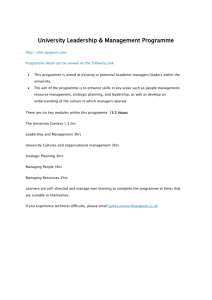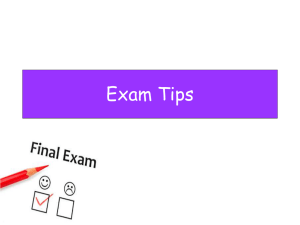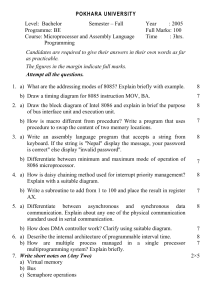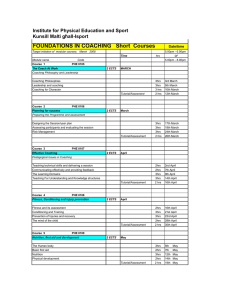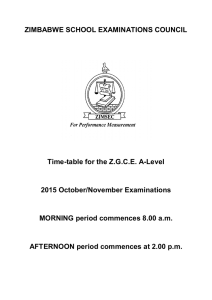MN206 Marketing Management Examination 2006
advertisement
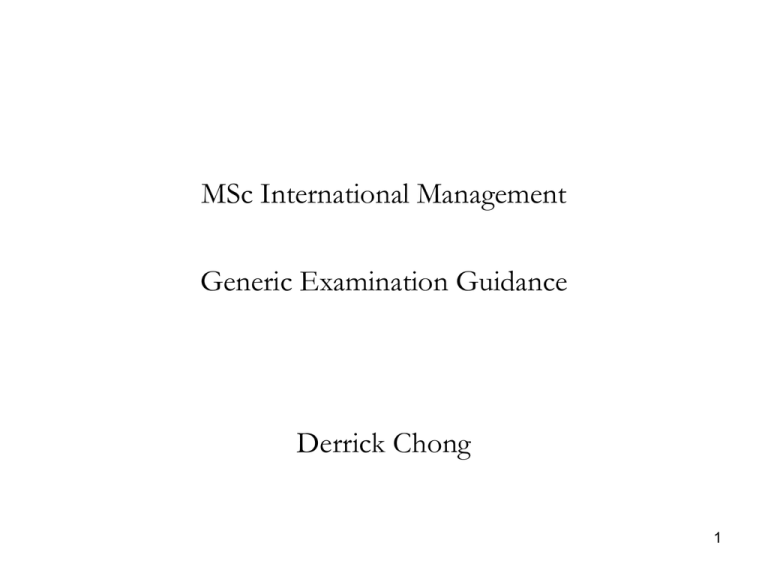
MSc International Management Generic Examination Guidance Derrick Chong 1 Role of the College in the Exam Process • The College, as part of the University of London, takes the exam process very seriously • The College sets the exam timetable not the School • With your exam timetable, you receive an exam candidate number • Any infractions of the College’s exam regulations will be noted by the invigilators – Consequences can be severe (e.g., a mark of 0% being awarded for the exam or termination of degree registration) 2 Purpose of Generic Exam Guidance • Pre-exam, exam day, and post-exam guidance • This guidance session is generic, which is of particular interest for those who are reading (studying) at a British university for the first time • Please refer to the individual courses for guidance that is specific – – – – – – MN5111 – International Accounting & Finance MN5113 – International Marketing Business Economics MN5114 – International Strategy MN5118 – Business Economics MN5121 – Information Systems & Operations Management MN5131 – International HRM & OB 3 Pre-Exam Stage Role of Past Exams • Past exams for all courses can be assessed via Moodle and the College Library’s online portal • Past exams, unless indicated otherwise by the instructor, provide a good indication of exam rubrics – Style of questions (form) – Subject matter of questions (content) – Number of questions / time length • Do not memorize responses to previous exam questions 4 Exam Rubrics Code Course Title Duration Rubrics • MN5111 International Accounting & Finance 3hrs • • MN5113 International Marketing • Section A – 6 out of 10 questions; Section B – 2 out of 6 questions • 3 out of 6 questions • 3 out of 5 questions • • Section A – 2 out of 5 questions Section B – 2 out of 5 questions • 3 out of 8 questions 3hrs MN5114 International Strategy 3hrs MN5118 Business Economics 3hrs MN5121 IS and Operations Management 3hrs MN5131 International HRM & OB 3hrs Section A – 1 compulsory question; Section B – 2 out of 5 questions 5 Pre-Exam Stage Exam Preparation • Establish a revision schedule – It should take into account the exam schedule – It should take into account your particular areas of strength and weakness (re: core courses) • It is unlikely that instructors will repeat questions from one year to the next • Many exams offer choice, which may influence your study habits • Do not focus too narrowly on topics • Do not limit yourself to the bare minimum 6 Pre-Exam Stage Revision Resources • Even if you do not to gather any more material, a reasonable amount is at your disposal – Assigned readings, lecture notes, and other materials uploaded onto Moodle – Readings you collected to complete assignments – In-class tests – Additional material can be obtained from the usual sources (e.g., business press, Business Source Premier, ABI-Inform) 7 Contact with Instructors in April and May • For consultations outside the teaching term, there is limited availability; email is the best mode of contact, though instructors may not be able to respond • Note that instructors are not permitted to assess mock answers to past exam questions 8 Exam Day • Ensure you have the right day, time, and location of the exam: arrive about 15 mins before the start • Seating is allocated by your exam candidate number • Bring 2-3 pens (blue or black ink); do not use a pencil • There is no need for white-out or highlighters; crossout any errors • Bring a watch – to monitor your use of time – as mobiles are not allowed and direct sight of the clock in the room may be limited • Dictionaries are not permitted • Calculators will be provided, if required 9 How to Allocate Your Time • Read the instructions – How much time is allocated? – How many questions must be answered? – Are there compulsory questions/sections? • Spend the first 5-10 mins reading the entire exam – that is all the exam questions – and decide which ones you will answer 10 How to Allocate Your Time (cont’d) • In responding, ensure that time is spent on a question in proportion to the marks allocated to the question – E.g., answer 3 essay titles from a list in 3 hours: each is worth one-third of the available marks, means 4555 mins each; do not over-run on the first question as you will be at a disadvantage in answering the others – E.g., with problem sets, note how the marks are allocated; show your work to be awarded part marks 11 During the Exam • Try to stay calm • Start each question on a new page • Legible handwriting is important as it will aid the markers in assessing your work; illegible handwriting may result in the exam not being assessed (i.e., you will be asked to re-sit the exam) • If you need any assistance during the exam – such as another exam booklet or to go to the toilet – raise your hand to alert an invigilator • Do not leave your seat without permission • Do not talk • At the end of the exam, you will be asked to tie the exam booklets together in sequential order with a piece of string; if you are unsure how to do this, ask an invigilator for assistance • Invigilators report all exam infractions to the Academic Registrar 12 Answering ‘Essay’ Questions • Ensure that your answer is a direct response to the question, rather than merely addressing the topic implied in the question • Common formats – Direct question or set of questions (why and how) – Based on a quote (discuss/analyze/critique) – Compare/contrast (relationship) • Each response requires engagement with the essay title; it is unusual to be asked to provide a list or description 13 Answering ‘Essay’ Questions (cont’d) • Do not memorize responses to popular topics (or questions from past exam papers) • Do not identify the question as about ‘X’ and then proceed to write all you know about ‘X’ – The question is probably posed in a manner to force you to tackle a statement (or statements) about ‘X’ • References to relevant literature and practical examples are deemed as highly appropriate for a full and complete response 14 Answering ‘Numerical’ Questions or Problem Sets • Show your calculations (workings) in the exam booklet not the exam script – Partial marks are awarded – Some errors in calculation can be carried forward in how marks are awarded – Note that the exam script is separated from the exam booklet • Do not leave questions blank 15 Exam Marking/Assessment Procedure • Course instructors serve as first markers; this helps to ensure consistency and fairness • For marking criteria and classification system, see the Postgraduate Student Handbook on the School’s website – 70-100% (Distinction) – 60-69% (Merit) – 50-59% (Pass) – 40-49% (Fail – Condonable) – 0-39% (Fail – Non-Condonable) • Your performance vis-à-vis others sitting the exam is considered, thus there is a sense of relative marking • External examiners – a fundamental feature of the UK university system – tell us to ‘mark the range’ 16 Post-Exam • Candidates who have condonable and non-condonable fails will be contacted by the School (re: options available, including re-sits in August 2012) • There is no formal progression to the IRP stage 17

